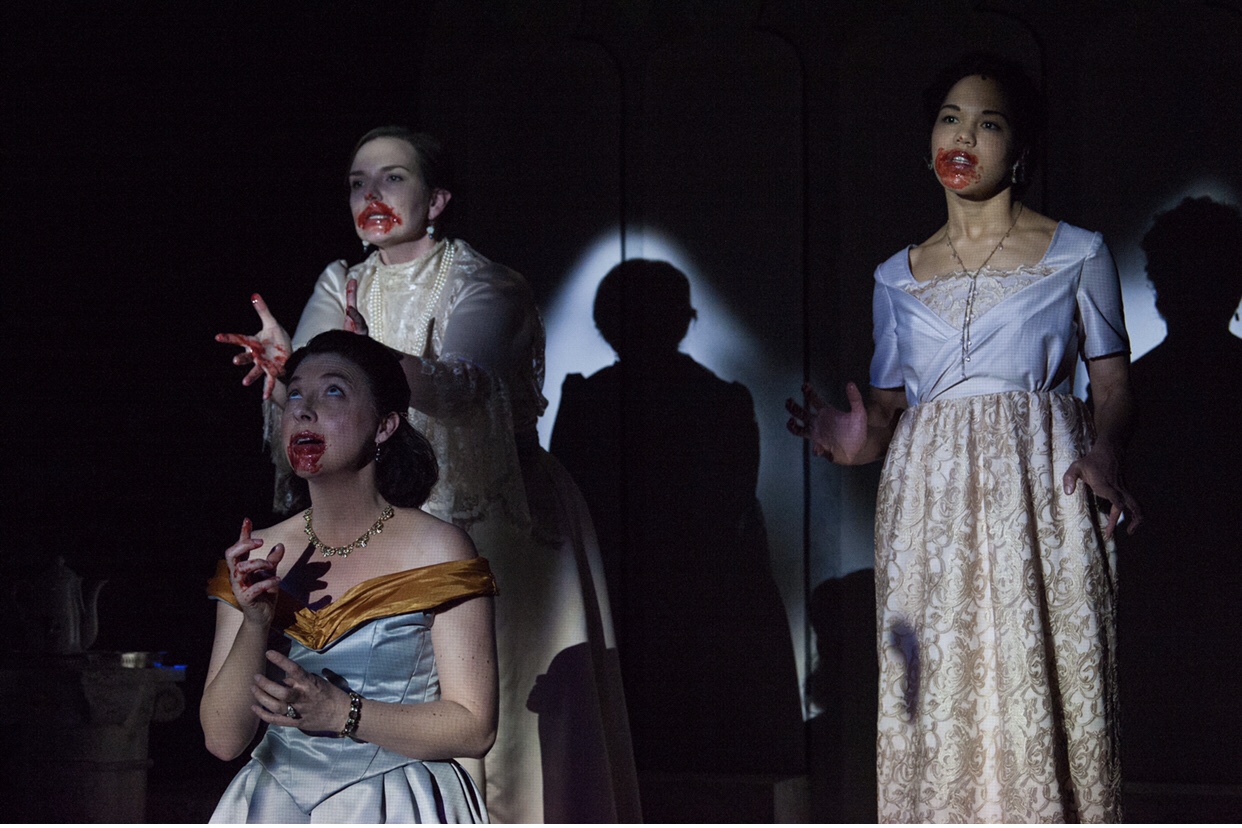By Andrew Hamlin
NORTHWEST ASIAN WEEKLY

“There will be… liberal use of stage blood, should occasion warrant it,” warns the email invite confirmation to “The Angel in the House,” a new play written and directed by Seattle’s Sara Porkalob. I’m here to reassure the squeamish, though, that the stage blood only comes out at one or two crucial junctures, and isn’t terribly likely to splatter. This is Café Nordo after all, and over a three-part show and a four-course dinner, they intend to maintain decorum. And sanitary eating conditions.
Porkalob admits she took some inspiration from the poem by Victorian author Coventry Patmore, praising the ideal Victorian wife as an “angel in the house,” a phrase that gained wide popularity. But she only used that poem as a springboard.
“Honestly, I thought it was a bad poem in terms of storytelling, so it was hilarious to find out that the poem
inspired the idea of ‘ideal Victorian femininity,’” recalled the playwright.
“I’m an only child, and growing up, I was surrounded by adults who wanted to foster in me a love of reading. I spent most of my childhood with my nose buried in books. Dickens, the Bronte sisters, and old English/Russian/French epics were my reading fare between the ages of 9 to 14 years old. The Victorian era is one I’m very familiar with as a result and one that I love very much. I decided to write plays (and now screenplays) about the time period to reclaim it as one bodied by feminism and populated by people other than white folks.”
Her “Angel” begins on New Year’s Eve, 1899, with a very prim and proper upper-crust English New Year’s celebration hosted by Lady Amelia Brown (Angela DiMarco) and her husband Sir Edmund Brown (David S. Hogan). Lady Amelia has her best friends (played by Ayo Tushinde and Tatiana Pavela), Sir Edmund his own (Robin Ian HallSmith and Ray Tagavilla).
Soon enough, though, eerie undercurrents present themselves as the guests prepare for midnight. The men hide deep secrets: A deep anticipation of a prophecy to be fulfilled and an equally deep fear of another prophecy, foreseeing destruction.
“The entire team, from actors to designers to the kitchen to the Nordo staff and administration, every single one of them is making this show incredible,” explained Porkalob. It takes a village to make a play and while you only see the actors on stage every night, there are so many others behind the scenes supporting and creating the show.”
In addition to their acting duties, the cast also serves the four-course dinner created by Nordo chef Erin Brindley. Porkalob advised Brindley to showcase the tension between nature and industry, chaos and order.
So Brindley came up with a menu that features molded flowers in each dish. The molds are very regular, industrial-made, so the flowers (made of Shan tofu, goat cheese, or duchess potatoes, depending on the dish) look like engineered beauty, while surrounded by really earthy flavors like chrysanthemum leaves, beet and pear soup, or duck.
When asked about the most challenging aspects of writing “Angel,” Porkalob replied that she knew the story she wanted to tell, but the challenges lay in how to divulge information, how to lay out the plot’s twists and turns, keeping the audience on edge without revealing too much.
“Everything I write is bodied by my lived, intersectional experience as a woman of color who is also a feminist,” she concluded. “So, this play is influenced by that. It’s my first foray into the genres of thriller, revenge, and horror and definitely not my last.”
When asked about future plans after this show, she answered simply, “The usual Sara Porkalob plans…world domination.”
“The Angel in the House” plays through March 15 at Café Nordo, the Culinarium at Nordo building, 109 South Main Street, Seattle. For prices, showtimes, and other information, visit cafenordo.com.
Andrew can be reached at info@nwasianweekly.com.



